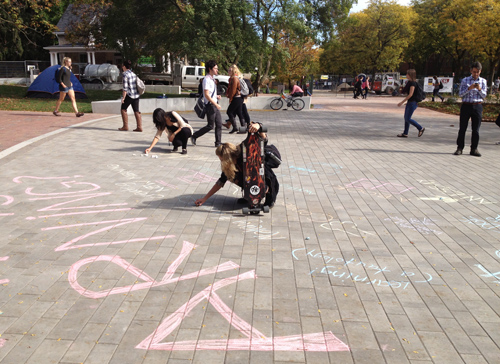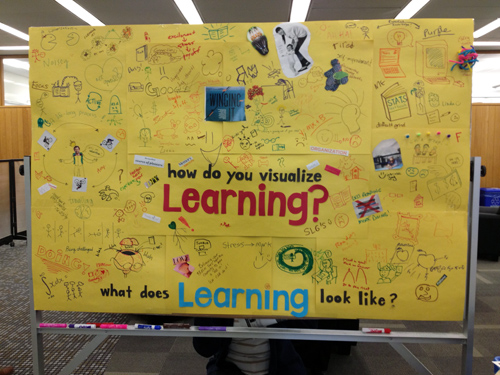
What does your ideal university look like?
Answer the question and you might win an iPad – not to mention adding your voice to a months-long discussion about learner-centredness at the University of Guelph.
As part of a new contest beginning Feb. 1, all U of G community members may submit an entry explaining their vision of the ideal university. Entries may take any form, from poems, photos and podcasts to videos, songs and performance pieces to essays, plays and dance.
The entry deadline is March 15. Entries will be judged on creativity, clarity and sense of community.
It’s open to current students and grads, staff, administrators and instructors.
The contest is the latest event being run this year under the Learner-Centredness Project (LCP) on campus.
That project began last fall as a way to get students and instructors talking about learner-centredness, one of the University’s strategic priorities.
The project effectively reminds community members “why we are all here at the University,” says Natasha Kenny, manager of educational development with Open Learning and Educational Support, which runs the project along with library staff.
That discussion has taken place through monthly events held since September. The events are intended to be collaborative, spontaneous, low-tech, interactive and fun, she says.
In September, Kenny and others chalked “What is learning?” on the newly reopened Branion Plaza.
Hundreds of students wrote down their answers. Kenny says one student thanked her for the initiative, saying, “I hadn’t stepped back to think about why I’m here.”
October brought the question “How do you visualize learning?” Respondents used markers and magazine cutouts to decorate a mural in the library. In November, the project team wandered the campus with whiteboards and invited community members to answer “What does learner-centred mean to you?”

Besides the learner-centred contest, planned initiatives this semester include asking “28 Questions Over 28 Days” through Twitter. In March, the team intends to ask community members about when they felt most engaged as learners and teachers.
Kenny says she’s surprised at students’ willingness to take part and at their honesty, even in expressing fears and anxieties.
Says Erin Aspenlieder, educational developer in Open Learning and Educational Support: “This project has been a fantastic way to ask questions. It lets you reflect.”
The project is also meant to explore what learner-centredness means. Kenny says the approach challenges students to assume responsibility for their learning.
“Assessment often evaluates student learning from the instructor’s perspective,” she says, “but learner-centredness allows the student to evaluate their own success.”
Aspenlieder adds that the concept also extends learning beyond the lab and classroom. “It happens in the athletic centre, the library. Learning can’t be boxed into the lecture hall or the syllabus. You’re dealing with the person in all their complexity and richness.”
Along with M.J. D’Elia, the library’s acting head, learning and curriculum support, they will discuss learner-centredness at this summer’s conference of the Society for Teaching and Learning in Higher Education.
The learner-centred project contest is run by the LCP and sponsored by the office of the associate vice-president (academic).
For more information about the contest and other project initiatives, visit http://thelearnercentredproject.wordpress.com/.